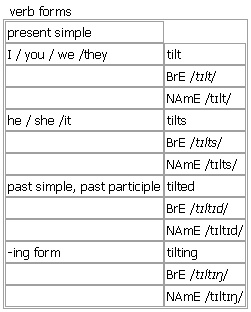 tilt
tilt

tilt [tilt tilts tilted tilting] verb, noun BrE [tɪlt] NAmE [tɪlt]
verb
1. intransitive, transitive to move, or make sth move, into a position with one side or end higher than the other
Syn: ↑tip
•(+ adv./prep.) Suddenly the boat tilted to one side
•The seat tilts forward, when you press this lever.
•~ sth (+ adv./prep.) His hat was tilted slightly at an angle.
•She tilted her head back and looked up at me with a smile.
2. transitive, intransitive ~ (sth/sb) (in favour of/away from sth/sb) to make sth/sb change slightly so that one particular opinion, person, etc. is preferred or more likely to succeed than another; to change in this way
•The conditions may tilt the balance in favour of the Kenyan runners.
•Popular opinion has tilted in favour of the socialists.
Verb forms: 
Word Origin:
late Middle English (in the sense ‘fall or cause to fall, topple)’: perhaps related to Old English tealt ‘unsteady’, or perhaps of Scandinavian origin and related to Norwegian tylten ‘unsteady’ and Swedish tulta ‘totter’.
Example Bank:
•Her face was tilted towards the sky.
•She thought for a minute, her head tilted to one side.
•The ground tilted sharply downwards.
•Tilt the mirror away from you.
•She tilted her head back and looked up at me.
•The boat tilted to one side.
Idioms: ↑full tilt ▪ ↑tilt at windmills
Derived: ↑tilt at somebody ▪ ↑tilt at something
noun
1. a position in which one end or side of sth is higher than the other; an act of tilting sth to one side
•The table is at a slight tilt.
•He answered with a tilt of his head.
2. an attempt to win sth or defeat sb
•She aims to have a tilt at the world championship next year.
Word Origin:
late Middle English (in the sense ‘fall or cause to fall, topple)’: perhaps related to Old English tealt ‘unsteady’, or perhaps of Scandinavian origin and related to Norwegian tylten ‘unsteady’ and Swedish tulta ‘totter’.
Example Bank:
•a tilt to the left
|
|
